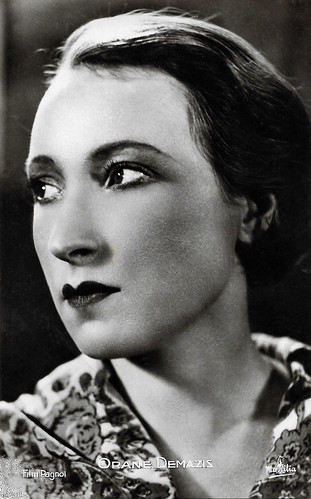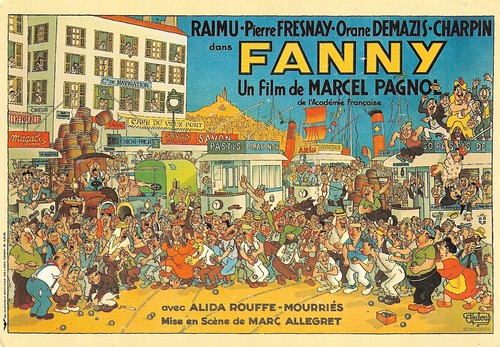
French postcard by Massilia. Photo: Film Pagnol.

French postcard, no. 522.

French postcard by Crépa, Editeur, Paris. Photo: Pierre Méré. Orane Demazis in the role of Arsul in Regain/Harvest (Marcel Pagnol, 1937).
The Marseille film trilogy
Orane Demazis was born Henriette Marie Louise Burgart in 1904 in Oran, French Algeria, in a family of Alsatian origin. Demazis entered the Paris Conservatoire National Supérieur d'Art Dramatique in 1919. She formed her stage name after her birthplace of Oran and the name of Mazis, another nearby town.
Upon graduating in 1922, she joined the Théâtre de l'Atelier cast directed by Charles Dullin. Between 1922 and 1926, she starred in 'Carmosine' by Alfred de Musset, 'L'Occasion' by Prosper Mérimée, 'Chacun sa vérité' by Luigi Pirandello, 'Petite Lumière et l'Ourse' and 'Huon de Bordeaux' by Alexandre Arnoux, and 'Voulez-vous jouer avec moâ' by Marcel Achard.
Her encounter with Marcel Pagnol in 1923 marked a turning point in her career. The two fell in love and he created some of her most famous roles. In 1926, he hired her to act in his play 'Jazz'. Then he created for her the role of Fanny in 'Marius' (1929), 'Fanny' (1931), and the film Caesar (Marcel Pagnol, 1936). In 1933 Demazis and Pagnol had a son, Jean-Pierre Burgart, but Pagnol could not recognise him while his wife Simonne Collin refused a divorce.
Orane Demazis repeated her role as Fanny in the film adaptation Marius (Alexander Korda, 1931). The film was made by Korda for the French subsidiary of Paramount Pictures and was a huge success. The second part of the Marseille film trilogy, Fanny (Marc Allégret, 1932) was also a box office success in France and is still considered to be a classic of French cinema. Demazis was the star of Angèle (1934), a drama film directed, produced, and written by Marcel Pagnol, based on the novel 'Un de Baumugnes' by Jean Giono.
That same year, she played Eponine in Les Misérables (Raymond Bernard, 1934), the excellent film adaptation of Victor Hugo's 1862 novel of the same name. Les Misérables, starring Harry Baur as Jean Valjean and Charles Vanel as Javert, lasts four and a half hours and is considered by critics to be the greatest adaptation of the novel, due to its more in-depth development of the themes and characters, in comparison with most shorter adaptations. It was released as three films that premiered over three weeks.

French postcard by A.N., Paris, no. 930. Photo: Pathé Natan. Orane Demazis as Eponine in Les Misérables (Raymond Bernard, 1934), based on the novel by Victor Hugo.

Belgian collectors card, which promotes the screening of the film at Majestic, Gand. Photo: Pathé-Natan. Orane Demazis as Eponine and Emile Génevois as Gavroche in Les Misérables (Raymond Bernard, 1934). Caption: Les Thénardier.

Belgian collectors card, which promotes the screening of the film at Majestic, Gand. Photo: Pathé-Natan. Orane Demazis as Eponine and Jean Servais as Marius in Les Misérables (Raymond Bernard, 1934). Caption: Les Thénardier.
Her career on the sidetrack
Then Orane Demazis appeared opposite Raimu in César (1936), written and directed by Marcel Pagnol. It's the final part of his Marseille trilogy, which began with the film Marius and was followed by Fanny. Unlike the other two films in the trilogy, César was not based on a play by Pagnol but written directly as a film script. In 1946 Pagnol adapted the script as a stage play.
Pagnol also directed her in Regain/Harvest (Marcel Pagnol, 1937) in which she co-starred with Fernandel, Marguerite Moreno, and Gabriel Gabrio, and in Le schpountz/Heartbeat (Marcel Pagnol, 1938) starring Fernandel. She also appeared in the drama Le feu de paille/Fire in the Straw (Jean Benoît-Lévy, 1939) starring Lucien Baroux.
In 1938, Orane Demazis' relationship with Marcel Pagnol came to an end. This break with Pagnol and the outbreak of the Second World War put her career on the sidetrack. In the next decades, she was rarely seen in the cinema, but she did appear in three films set in Provence, her favourite film location. One of these was Bagarres/Wench (Henri Calef, 1948) with Maria Casarès and Roger Pigaut, and another one was La caraque blonde (Jacqueline Audry, 1953), starring Tilda Thamar, and Roger Pigaut.
This was followed by a long period without films. In the 1970s, she made a modest comeback. She appeared in Rude Journée pour la reine/Rough Day for the Queen (René Allio, 1973) with Simone Signoret. Then she was asked by famous film author Luis Buñuel, to appear in his surreal comedy Le Fantôme de la liberté/The Specter of Freedom (Luis Buñuel, 1974). André Téchiné cast her in his film Souvenirs d'en France/French Provincial (André Téchiné, 1975) starring Jeanne Moreau.
The television world also called on her several times. She appeared in the clever film adaptation of Colette's autobiographical novel, La Naissance du jour/Break of Day (1980) starring Danièle Delorme, the only television film Jacques Demy ever made. Her final feature film was Bastien, Bastienne (Michel Andrieu, 1980) with Juliet Berto, and Anna Prucnal. Orane Demazis died in 1991 at the age of 87 in Paris. She shared her life with Pagnol from 1925 to 1938. Her son is the painter and writer Jean-Pierre Burgart.

French postcard by Editions et Publications cinématographiques, no. 35. Photo: Paramount.

French postcard by Crépa, Editeur, Paris. Photo: Pierre Méré. Orane Demazis in the role of Arsul in Regain/Harvest (Marcel Pagnol, 1937).

French postcard by CPM / Jean Dubout, 1982. Poster (1950) by Albert Dubout for Fanny (Marc Allégret, 1932), based on the play by Marcel Pagnol.
Sources: Wikipedia (English, Dutch and French) and IMDb.
This post was last updated on 20 December 2023.
1 comment:
¿Un post para la bella e inteligente Orchidea de Santis?
Post a Comment